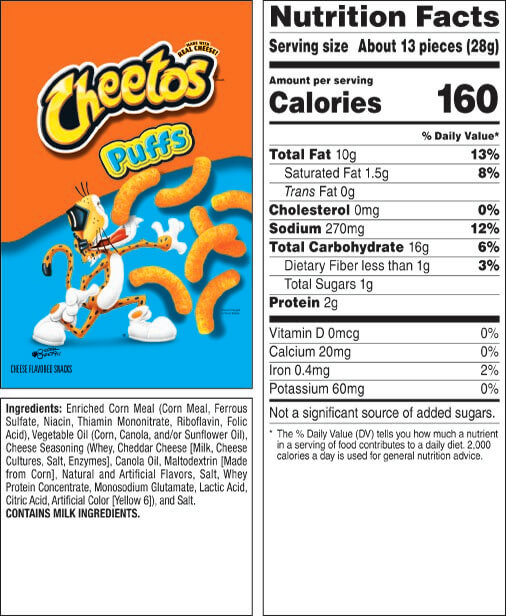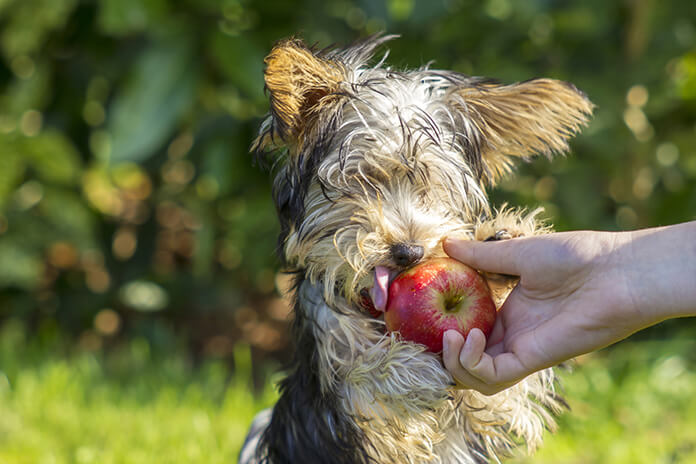
Contents
Most of us crave for junk foods so much, even though we know it is an unhealthy food. Yet, we savor and continue to eat them anyway, and that includes Cheetos as well. Eating junk foods once in a while is completely fine, but what about giving it to a dog?
You have definitely wondered about giving your dog some tasty Cheetos too. Definitely, Fido would like to taste one! But can dogs have Cheetos? Let's find out.
Can Dogs Eat Cheetos?
The fleeting answer is: No, it is not recommended to feed Cheetos to your dog. Giving your dog a few pieces of Cheetos puffs as an occasional treat is fine, but it shouldn't be a frequent thing.
Can Dogs Eat Hot Cheetos?
Much like cheesy puffs, Hot Cheetos are no good for your pup.
Typically, Hot Cheetos, e.g. Crunchy Flamin’ Hot, contains garlic powder, an ingredient highly toxic to dogs.
This is because garlic powder contains thiosulfate – a compound that causes severe oxidative damage to red blood cells, leading to a dangerous condition called hemolytic anemia.
Is there Any Nutritional Value in Cheetos?

Source: fritolay.com
If you’ve ever looked at the ingredient list, you know the answer: Cheetos are hardly a healthy option for humans, let alone dogs.Think about it: one 13-piece serving of Cheetos Puffs contains a whopping 160 calories, much of which come from poor quality fats, as well as 270 mg of sodium – and no one actually stops at 1 recommended serve either. With only 2 grams of protein and hardly any fiber or micronutrients, we recommend giving those a hard pass.
Cheetos Ingredients
As mentioned above, the main ingredients in Cheetos are no good for your pooch – much like any other processed snack. First on the ingredients list if enriched corn meal, which is cooked and then generously dusted with cheese seasoning. The seasoning contains MSG and yellow #6 coloring, both potentially harmful for dogs. On top of that, the snack contains lots of empty calories, chemical additives, and low quality saturated fats, which are far from essential for your dog’s well-being.
Fat and Sodium Content
Cheetos have alarmingly high fat and sodium content. Unfortunately, modern diets of canines and felines are overpowered by saturated fats, which can be detrimental for overall health.
Excessive dietary fat is a known cause of obesity, which in turn can trigger heart disease, kidney issues, and diabetes.High sodium content means Cheetos are a terrible snack for dogs. Too much dietary salt can be a cause of hypertension, heart problems, and stroke.
What Happens If a Dog Eats Cheetos?
One piece every now and again is unlikely to be an issue – however, consuming too much Cheetos may cause immediate symptoms such as diarrhoea, stomach pain and discomfort, and vomiting. If diarrhoea and vomiting don’t stop, consult a vet immediately and mention that your dog possibly consumed too much Cheetos.
Healthier Alternatives to Cheetos

If you want to treat your dog, consider offering fresh fruit or vegetables – a great natural snack free of any chemicals or added salt and fat. Think it’s weird to offer your dog fruit and veggies? Worry not, as naturally, dogs are open to all foods.
Try offering a carrot stick, a green bean or a slice of pumpkin – or how about some delicious fruit, e.g. bananas, apple or berries?
Experiment with different flavors, and you will soon find out what your pup enjoys.
In Summary
There are many awesome treats for dogs – but Cheetos are not one of them.
Instead of processed snacks, try offering your pooch natural, healthy alternatives such as fruit and vegetables, or even a slice of cheese if your canine is not lactose intolerant.
Dig this post? You may be interested to read the following articles:



















